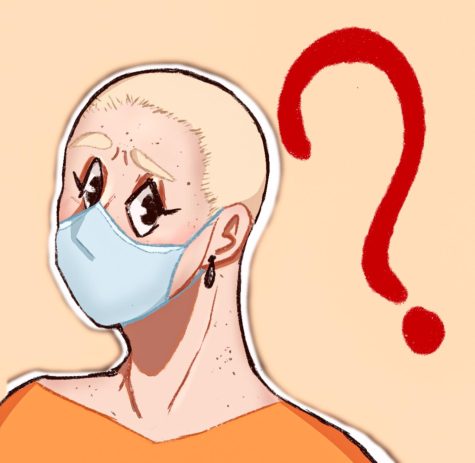International student health insurance education lacking
International students unaware of all health options
November 4, 2021
Only 9 percent of the students said yes to having a basic understanding of their health insurance. Only 4 percent said yes to having awareness about the mental health resources at WSU, according to the graduate student health brief report provided by Cougar Health Services in 2020.
Half of the respondents in the survey believe that WSU is not providing enough health-related services, but the reality could be they are just unaware of the resources available to them.
Kate Hellmann, WSU International Student and Scholar Services director, and Cody Tornow, WSU’s lead international student adviser, helped clarify some of the basic healthcare services offered to the international students and scholars.
“Every international student or student who is at the graduate level on an assistantship is required to pay a mandatory health fee and also should have health insurance,” Hellmann said.
There is a significant difference between what the mandatory health fee and health insurance can cover.
“The health fee is what covers the base cost of operating Cougar Health Services and also is the funding mechanism for Counseling and Psychological Services,” Tornow said.
Tornow said CAPS is basically set up to establish baselines. If you have some urgent and dire mental health needs, CAPS is making sure everyone has this universal, low-barrier access. However, it is not supposed to be a replacement for long-term ongoing mental health care.
CAPS has partnered with other service providers in the community, and you can be referred to these outside sources for long-term care.
“Think of CAPS as an onboarding and offboarding ramp that connects to other services,” Hellmann said.
As a domestic or an international student, if you are going to an off-campus provider for mental health needs, that is when the health insurance would kick in.
However, WSU Cougar Health and CAPS can advise students on questions like who is in the network — which means what the lowest cost options with your insurance are — versus what is outside of the network.
“The way health insurance works in the United States is complex, and it’s complex for everyone,” Tornow said.
“We in the Office of International Programs are doing some specific things to increase the amount of education, outreach and training that goes out to international students,” Hellmann said.
She said that the International Admissions does and will continue to send information about insurance at the time of recruitment and at the time of admissions and confirmation.
Specifically, they provide a Canvas tutorial to the international community coming in and an on-campus tutorial offered directly by Cougar Health Services.
They will also be resurrecting a series this coming spring called “Becoming a Cougar American: Life and Culture Series,” and health insurance will be one of those topics covered in the session.
ISSS has also been to different sessions with Graduate and Professional Student Association answering direct student questions, generically about insurance.
International students should keep an eye out for emails from the ISSS office about the tutorials and the upcoming series they are offering to provide updated information about graduate and international student health insurance.
“I really want students to feel empowered to ask questions. The opportunity exists there, it’s just a matter of us continuing to educate and sustain those educational efforts,” Hellmann said. “While our office doesn’t deal directly with the insurance, we can work to connect students with individuals that do.”
The ISSS office has completely redone the new international student orientation – it is now called a tutorial. It is also scheduled before students’ arrival on campus and is spaced out over several weeks, specifically because it is complicated and difficult to understand, and there is so much new vocabulary.
“Even if you’re coming from Canada or the U.K., where it’s not a language barrier, and the culture is so similar, the medical situation is not,” Tornow said. “I have to actively tell them to forget everything they know about how general health insurance works and strap them in to go on a very crazy and insane ride on how insurance works in the United States.”
Although I appreciate the efforts of ISSS in setting up a strong background and pre-arrival tutorials for the incoming international students about the health insurance at WSU, I feel like there is not enough outreach of this information to the currently enrolled international students.
More publicly available tutorials, a consistent helpline on questions about insurance and health fees and regular updates on the policies via the ISSS website could be really beneficial to the currently enrolled international students.
Tornow and Hellmann said that, fundamentally, the ISSS office is about connecting students with other entities on campus, including Cougar Health Services and CAPS.
This helps to ensure that all international students and scholars have access to and understand how to navigate the systems that support their experience while they are here.
They continue to refine and implement systems that are focused on students.
“There is a mechanism for student feedback that we do send out annually – an international student needs assessment,” Hellmann said. “We strategically use the data from that tool to make changes to everything that we do and all of the entities that we partner with on-campus to improve the international student experience.”
Both Hellmann and Tornow also said there is no “mission accomplished” when it comes to problems like these. The insurance information changes, the types of students can change, their needs change and policies change constantly.
“Nothing is ever going to be perfect. It’s dynamic but we care about doing the best that we can, by the students,” Hellmann said.
We as international students have a lot of other logistics to go over when navigating our daily lives in the U.S.
I strongly encourage the international student community at WSU to utilize the efforts of ISSS with their on-campus services and training by participating and providing regular feedback to improve their current outreach system.
At the end of the day, if you want answers, ask the questions. If you do not know what questions to ask, reach out to ISSS explaining your situation. They are here to play that supporting role for us.

















